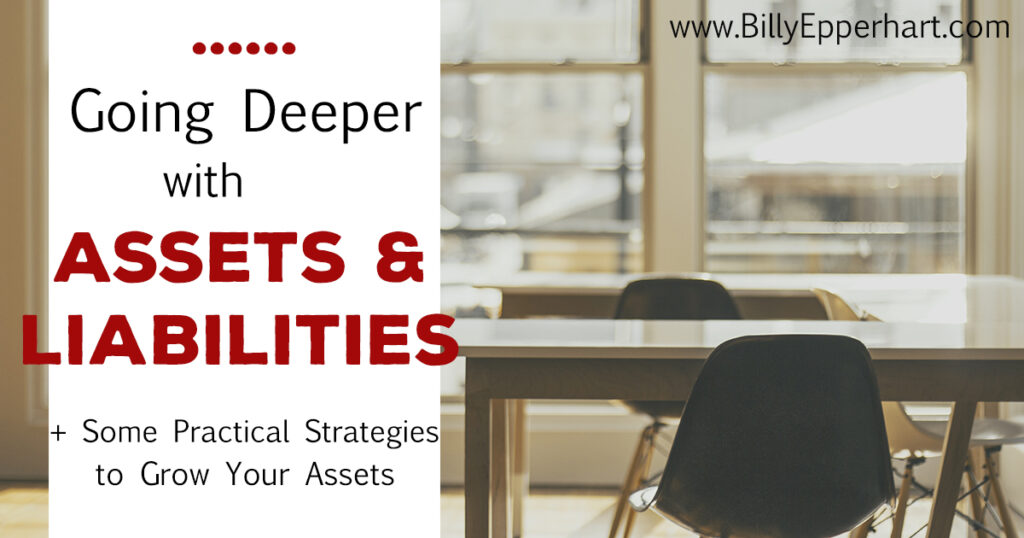One of the keys to becoming the master of your money is to live off of 80% of your income. If you are not already doing this, it will take time and energy to practice self-control. But when you begin living off of only 80% of your income, you will be in a stronger position to build wealth and reach the Second X of the Triple X Factor.
In order to manage this 80%, you must learn the difference between assets and liabilities. This knowledge makes a huge difference as you build wealth and begin mastering your money.
Think about it like this:
When you buy a flat screen TV, what happens to the value of the TV as soon as you leave the store? It depreciates in value – immediately. The TV is worth less than what you paid for it five minutes earlier. This is an example of a liability.
Assets are a completely different animal. Assets are things like stocks, real estate, and businesses. The biggest difference between an asset and a liability is that assets bring money to you.
Usually, when you begin building wealth at the Second X, you reach a point of having income from assets. This is a great place to be! Another name for this type of income is passive income. Rather than working and getting paid (the First X), you passively receive income from investments in real estate, a business, royalties, stocks, etc. (the Second X).
Here is my suggestion for you: Rather than paying for necessary things with credit – which would become a liability – I suggest that you pay for necessities with the income you earn from your assets.
For example, there is nothing wrong with buying an engagement ring, TV, car, or furniture set. But what if you bought it with cash from an asset instead of purchasing a liability?
This is really all about mindset. Can you patiently wait to accrue money from your assets, or will you give in to the desire for instant gratification? Will you make a plan for your money, or spend without much thought? Are your wants and needs worth spending income on a liability?
These are questions you must decide for yourself, and I suggest deciding the answers before you make your next big purchase. Otherwise, you’ll be tempted to put anything and everything on credit – adding to a list of liabilities, not assets.

Information is great, but if you can’t apply it to your life, it doesn’t do much good. So, I’ve included some asset-building ideas below. Think through your skills, God-given talents, desires, and time. What are some practical ways you can begin building assets?
1. Live off of 80% (70% for a true challenge) of your income and no more!
This may sound simple, but are you currently doing it? It’s okay to purchase anything you want and/or need, as long as you are doing so with your 70%-80%. It becomes dangerous when people start spending their emergency fund, their investments, and their savings on unnecessary things!
If all of your living costs are taken from 70%-80%, then you can use 10% to grow your emergency fund, 10% to pay off debt, and (if you’re taking the true challenge) 10% to grow your assets.
This may seem difficult at first, but in the long run, it will pay off and your assets will grow some each month.
2. Invest in real estate in your hometown.
I won’t go into too much detail about investing in real estate here, but this is one of the best way to grow your assets. Even one or two properties can make a huge difference!
Read this blog post about The 10 Steps to Investing in Real Estate.
I also recommend you check out my Real Estate Mastery audio series.
3. Start a home business.
Starting a blog or online business is a great way to build your assets! Think about it: if you put in some hard work up front and create an online course, write a helpful book, record an audio lecture series, or begin creating video tutorials, your hard work will pay off later! This is exactly how an asset works.
At the First X, you go to your job each day and are paid for the time you spend there. But if you create a digital product or write a book, you will spend a big chunk of time preparing the product and then make money from the product for years to come.
The key here is to make your product or business idea helpful for your customer. Do your research. Discover a need. Then, create a product to fulfill that need.
There are many ways to begin creating wealth from assets. I like to remember Proverbs 24:3-4 in The Living Bible, which says, “Any enterprise is built by wise planning, becomes strong through common sense, and profits wonderfully by keeping abreast of the facts.”
If you remember this truth and put it into practice as you increase your assets, you will be wisely mastering your money.
For more about money mastery & growing your assets, check out my book, Money Mastery. It’s available for purchase in the shop!



